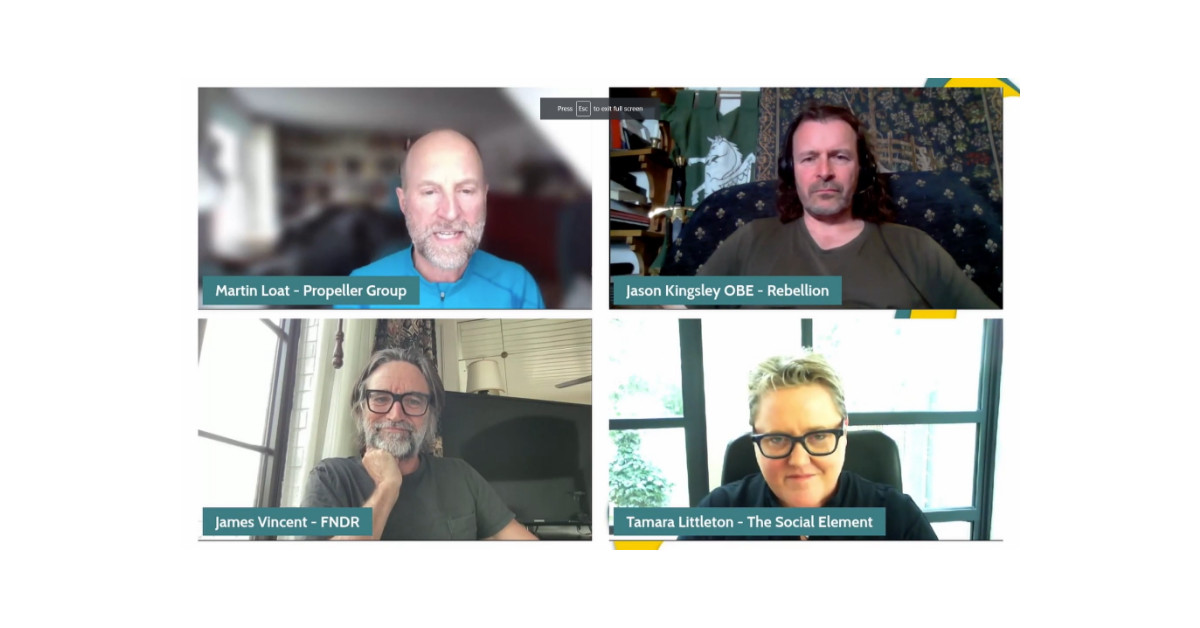Comms Club: The Big Issues – The value of leadership life stories and collaborating with comms teams

The leader plays an integral role in telling a company’s story. They can embody and convey the company’s values, articulate their business vision and generate valuable media coverage.
Increasingly, both investors and customers expect the person at the helm to be visible and businesses with high profile leaders are a step ahead of the competition.
Propeller founder and Chairman Martin Loat led a session on the importance of crafting a leadership persona and compelling company narrative at the virtual event Comms Club: The Big Issues.
The panel featured business leaders including Jason Kingsley OBE, co-founder of Rebellion Games and trustee of her Majesty’s Royal Armouries, Tamara Littleton, CEO and founder of social media agency The Social Element, and James Vincent, founder and CEO of FNDR and former Apple ad guru who worked directly with Steve Jobs.
Unleashing the authentic
Kingsley is an expert on medieval history and has thousands of followers for his YouTube channel. His dedication to understanding stretches to dressing as a knight and riding warhorses, which gives journalists something to focus on and offers a strong visual image when they write about Rebellion. But he says that CEOs who cultivate a particular interest or trait for the public gaze had to ensure they are being authentic as the public can “smell a fake a mile off.”
Littleton said focusing on her own personal brand has been massively important for the agency to cut through but she had to explore what she wanted to communicate. She said: “As a gay CEO it became more important to talk about these issues for the community and it has become a point of difference for me and the agency.” She added that it was important “to find a style and persona that suits you.”
Vincent is both a founder and advisor to founders or ‘refounders’ – defined as CEOs who are licensed to refocus and re-orientate a company. He said that FNDR’s first job with a client is to dig in “to find out who you are, what are you about and what kind of company you are trying to build.”
Collaborating with the comms team
How well leaders work with comms teams can have a significant impact on company profile. Kingsley says: “I try to empower the people around me and communicate as much as I possibly can. Broadly speaking I get involved [in projects] at an early stage rather than swooping in and changing everything I try to be involved all the way along, so nothing is a surprise to me.”
Littleton added that smart leaders don’t make it “all about them” and said: “It’s so important to get key people in your company with their own profile and opinions – we want lots of voices within the agency.”
Vincent added: “The company is way stronger if everybody has their own profile – it’s a lot more sustainable for the company if it’s not just about the founder.”
Listening to advice from experienced comms advisors can pay dividends. Vincent described how he worked with Evan Spiegel, co-founder of Snapchat, to help move the perception that Snapchat was all about “lying to strangers” and at one point they found the perfect opportunity to shift he narrative.
Spiegel was due to speak at a big conference on the stage ahead of Facebook and they knew he was likely to face questions about Facebook copying Snapchat’s IP for Instagram Stories. Vincent advised that if nothing else he should deliver one specific line: “I wish they would steal my policy on privacy.” This simple, punchy point changed the media narrative hugely to Instagram’s benefit.
Profile-building tips
- Ensure extra-curricular interest or passion point is authentic
- Find a leadership style and persona that suits you – don’t try to copy someone else’s
- Be humble about the brand and yourself occasionally. Showing humility at a certain point in the trajectory of the business can bolster actually reputation and allows you to talk about all the ways you are trying to improve products or services
- Make sure discussions with the comms teams are a two-way exchange
- Don’t assume getting good coverage in one form of media equates to getting coverage in another form of media. Different channels have different audiences
To read the key takeaways from other Comms Club: The Big Issues sessions click the below links:
Getting boardroom buy-in for PR pushes
Keeping calm and carrying on in a comms crisis.
Can companies communicate both purpose and profit?
You can watch the full panel by clicking here.